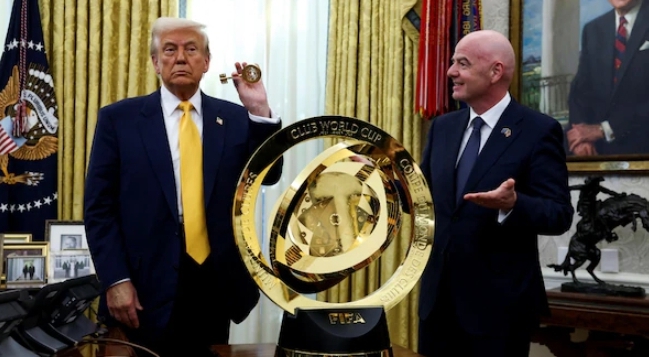The United States of America is set to take centre stage in both international and club football in the near future, having secured the hosting rights for a series of major global events. Later this summer, the US will host the FIFA Club World Cup for the first time, and next year, it will co-host the FIFA World Cup alongside Mexico and Canada. This will mark the return of the world's biggest football event to American soil after 32 years.
Why US President Donald Trump's Policies Threaten FIFA's American Dream


In addition to this, the US will make its mark in football history by hosting expanded versions of both events. The Club World Cup, which has seen limited participation in most editions, will expand to include 32 teams this year, up from single digits, with the exception of the 2001 edition (which featured 12 teams).
Similarly, the FIFA World Cup, which has been a 32-team competition since 1998, will expand to 48 teams next year, with the US playing a vital role by hosting the majority of the fixtures, including the final.
However, both of these prestigious events face complications due to US President Donald Trump’s policies on tariffs and immigration, which have created significant turbulence in American foreign policy.
Why Trump Administration’s Policies Threaten the Two FIFA Events in the US
President Trump has played down concerns regarding the Club World Cup, which will take place across 11 American cities from 14 June to 13 July. Speaking at an event at the White House with FIFA President Gianni Infantino present, Trump said:
“I think it’s going to make it more exciting. Tension’s a good thing, I think it makes it much more exciting,” he told reporters in the Oval Office.
However, ticket sales for the Club World Cup have been sluggish, with only a couple of months left before the tournament begins. The slow sales come at a time when the US has seen a notable decline in tourism this year, with fewer visits from neighbouring Canada and Mexico, as well as from the United Kingdom, according to Bloomberg.
Despite this, Infantino downplayed concerns over the ticket sales, expressing confidence that stadiums will be full.
“I don’t have any concerns about ticket sales. We’ll have full stadiums in America,” Infantino said.
“If in America you fill football stadiums for friendly games, then when you bring a World Cup and the best players to win a competition… we’ll have to promote it, we’ll have to present it, we’ll have to explain it to the people.
“That’s what we are doing. But it’s a celebration of football, and the stadiums will be full, with fans coming from all over the world,” he added.
The current political climate in the US may cause potential fans to hesitate before booking tickets for both the Club World Cup and next year’s FIFA World Cup if the situation remains unchanged.
‘The World Loves America’: Infantino
Infantino, however, stated that he has received assurances from the White House that international football fans visiting the United States for the two World Cups will not face any issues.
The FIFA President also met with US Attorney General Pam Bondi and FBI Director Kash Patel at the FIFA office in Miami to discuss security measures as well as potential visa issues for travelling fans.
“The world loves America, whatever some might say,” Infantino remarked.
“It’s absolutely crucial that we have this collaboration. This would never have been possible a few years ago with the image that FIFA had. We’ve come a long way. Today, we work in a clear, transparent, and ethical manner.
“We’ll bring the world to the United States of America. These are the guarantees the US government made at the time of the bidding, and reconfirmed, of course. The world will be welcomed,” he added.
The United States Olympic and Paralympic Committee (USOPC) has expressed similar concerns regarding the LA28 Games set to take place in Los Angeles in three years. An internal memo had revealed that the Trump administration was considering “sweeping travel restrictions”. However, USOPC Chair Gene Sykes has stated that he has received “significant reassurances” from the White House regarding visas for the 2028 Olympics and Paralympics.
In defiance of the Trump administration’s stance on trans athletes in women’s sports, the American Olympic body has refrained from drafting a policy on the eligibility of transgender athletes for the next Olympics.

 বাংলা
বাংলা  Spanish
Spanish  Arabic
Arabic  French
French  Chinese
Chinese 
